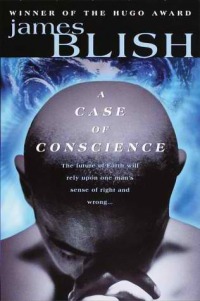
First published in 1958
Set in 2049, A Case of Conscience begins with four humans on the planet Lithia. Ruiz-Sanchez is a biologist and a Jesuit priest. Cleaver is a physicist. Agronski is a geologist and Michelis is chemist. They are members of the Lithian Review Commission, tasked with deciding whether Lithia would be a suitable port of call for Earth. Each commission member arrives at a conclusion by a different process of reasoning, although the "reasoning" employed by Cleaver, and particularly by Ruiz-Sanchez, is shaky. Cleaver believes Lithia would be ideal for the development of weapons while Ruiz-Sanchez thinks the planet is literally a satanic creation. Since Ruiz-Sanchez has arrived at a conclusion that is consistent with Manichaeaism, a religious philosophy discredited by his church, Ruiz-Sanchez expects to be excommunicated. He nonetheless casts his vote on that basis and the Commission returns home. The humans take with them a gift from the Lithians -- an egg that will hatch in flight, giving birth to Egtverchi.
The second half of the novel takes place on Earth, where Egtverchi proves adept at exposing human hypocrisy and, in his words, "breeding dissension." Given his own television show, he urges viewers to be mad as hell and not take it anymore, a message that suits his "audience of borderline madmen," as one person characterizes it, or in Ruiz-Sanchez' view, "those who feel cut off, emotionally and intellectually, from our society and its dominant cultural traditions." In other words, they feel alienated, and they identify with the alien who goads them. Egtverchi wants his followers to become wrenches in the cogs, to tear up their identity cards and abandon the cities.
Long before "worldbuilding" became a science fiction buzzword, James Blish carefully created a truly alien world (described in scientific detail in an appendix). Houses are made of ceramic pottery, each one unique. A tree that emits radio waves is the basis for long distance communications. Lithians have no politics, no nations, no media, no celebrations, no religion. The Lithians' science departs credibly from Earth's, in part because it is based on the unique characteristics of the planet Lithia. Blish managed to give the aliens (who resemble tall reptilian kangaroos) a genuinely alien culture as well as a unique means of reproduction and (for lack of a better term) childhood development. It is, in fact, the gestation process, and its apparent confirmation that intelligent creatures are the result of evolution, that convinces Ruiz-Sanchez of Lithia's satanic nature.
The future Earth that Blish imagined is a product of his time. Most people live underground, in bomb shelters the size of cities. The "Shelter economy" that developed eventually produced widespread rioting, which prompted the United Nations to create a true world government. That should have ended the threat of nuclear war and obviated the need for a Shelter economy, but the Shelter economy still prevails, although members of the ruling class live comfortable, decadent lives. Egtverchi is seen as a threat to the continued existence of the class division that serves the leaders so well.
Egtverchi's televised call for civil unrest seems like small potatoes in the day of 24-hour cable pundits, the wackiest of whom urge their wacky followers to do all sorts of wacky things. Yet Egtverchi's message resonates with those whose lives are spent in service of the Shelter economy, meeting labor quotas, never leaving their underground bunkers. To the extent that the Shelter economy is seen as quasi-communism (a frequent theme of 1950s science fiction), Egtverchi points the way to individualism.
A Case of Conscience is notable as one of the first science fiction novels to consider the core beliefs of Christianity in a universe where humans are not the only sentient species. It raises theological questions that are echoed in The Sparrow and some of Philip K. Dick's novels. A Case of Conscience relies heavily on Catholic dogma, and much of that dogma feels dated -- not that the religion has changed, but the world has. Ruiz-Sanchez' belief that if God did not create the Lithians, Satan must have done so (because only Satan would replace divine creation with evolution) seems a little silly (and the silliness of dogma may have been Blish's point), but Ruiz-Sanchez' sincere spiritual debate, the angst he feels while wrestling with spiritual issues, makes him a sympathetic character.
Several other issues of conscience are at play in the novel that make it worth a reader's time. One faction on Earth wants to develop Lithia for the dubious benefit of Earth in a way that will surely harm the Lithians. What, if anything, to do about Egtverchi's rabble rousing poses another dilemma. As a priest, Ruiz-Sanchez must decide whether to carry out the Pope's wishes despite his fear that the Pope's reasoning is flawed, a fear that forces him to confront the heresy that the doctrine of papal infallibility might itself be flawed. All of these issues are interesting, as is the world that Blish creates. If for no other reason, A Case of Conscience deserves to be read by a modern audience for Blish's lush prose.
RECOMMENDED